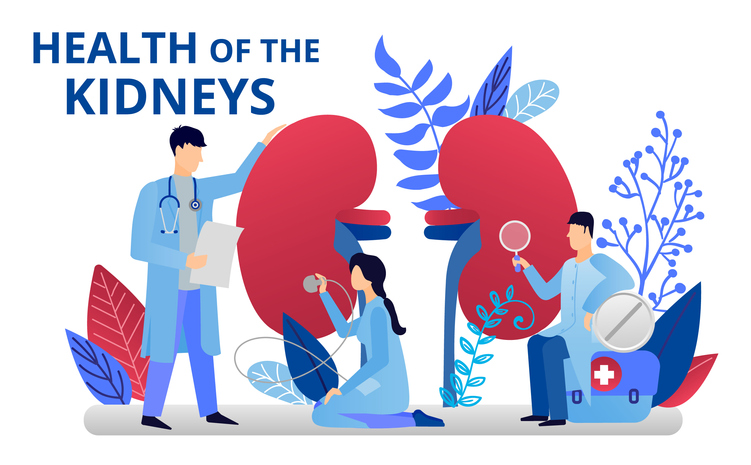Do You Know Your Risk? Improve Your Awareness of Kidney Disease
By Matthew GarzaAndrew Briskin
 Having a conversation with your healthcare team is one of the best ways to learn more about your risk for chronic kidney disease, make sure you’re getting the proper screening, and understand your treatment options.
Having a conversation with your healthcare team is one of the best ways to learn more about your risk for chronic kidney disease, make sure you’re getting the proper screening, and understand your treatment options.
Diabetes is the leading cause of chronic kidney disease (CKD) – affecting more than one-third of people with diabetes. However, research shows that some people with diabetes are unaware that they may be at risk for, or already have, early-stage CKD.
Even though the ADA Standards of Care recommends annual screenings for CKD at a minimum, making sense of your kidney test results and knowing when to act can be difficult. The two common indicators of kidney health are your “urine albumin to creatinine ratio” (or UACR) and your “estimated glomerular filtration rate” (or eGFR). Each test is a different way to measure kidney function and damage, and the combination of the two numbers provides an accurate assessment – to learn more, you can check out this helpful chart that explains your risk based on the combination of the two.
Many people with diabetes do not receive both of these tests. According to a recent study from the American Diabetes Association, nearly 90% of people with type 2 diabetes have received an eGFR test, compared to only 53% who have received a UACR test.
Making sure that everyone receives both of these key lab tests is particularly important when we look at data on people’s awareness of their risk and their treatment options. A recent study from dQ&A, a diabetes market research company, highlighted this, especially when compared to people’s awareness of heart disease. The study, which surveyed 1,021 people with type 2 diabetes, showed that only 57% of people answered that they “strongly agree” that having diabetes increases their risk for kidney disease.
Similarly, participants were asked whether they know their numbers “roughly” or “exactly” for specific health metrics. While 100% knew their weight, 98% knew their A1C, and 94% knew their blood pressure, only 38% knew their eGFR and only 26% knew their UACR. This is particularly concerning because diagnosing CKD in the early stages, when your UACR is only slightly elevated and your eGFR is only slightly reduced, is key to slowing the progression.
Talking with your healthcare team to ensure that if you have type 2 diabetes you receive both tests at least annually and if you have type 1 diabetes you receive both of these tests annually after you have been diagnosed for at least five years is essential. Data from dQ&A’s recent study of over 1,000 individuals show that less than half of people with diabetes have discussed their CKD risk with a healthcare provider in the last year. Those who do have these discussions with their healthcare team, come away not only knowing more about their risk, but also more about ways to reduce their risk, and their treatment options.
For example, several medications and lifestyle changes can dramatically slow the progression of CKD. Your healthcare team will focus on the importance of monitoring your blood pressure and lipid levels. In addition, they may suggest taking a blood pressure medication like an ACE inhibitor or angiotensin receptor blocker (ARB), which are often the first line of defense in treating kidney disease. Other things they may encourage you to do include adjusting your diet to reduce salt intake, limiting processed foods, limiting protein, increasing your exercise, and quitting smoking.
In addition, for people with type 2 diabetes, a class of drugs called SGLT-2 inhibitors (Jardiance, Farxiga, Invokana, and Steglatro) have also been shown to improve glucose control and lower your risk for eGFR decline and end-stage kidney disease. Another type of medication, called an MRA (Kerendia), has been shown to reduce the risk of eGFR decline, kidney failure, and certain heart conditions as well.
Often, many people’s healthcare appointments are jam-packed, with lots to cover in the very little time available with your healthcare team. Initiating a conversation with your provider and making sure you receive annual screenings for both eGFR and UACR (and having your provider to explain your test results) is key. Don't be discouraged from asking questions about ways to reduce your risk for CKD to help you and your healthcare team catch this condition early and slow its progression.
For more about medications for CKD, living with CKD and diabetes, and the importance of early screening, check out some of our articles below:
Want to learn more about what you can do to keep your kidneys healthy? Join us on December 14 at 5:30 pm EST / 2:30 pm PST for diaTribe Musings – Uncomplicating Diabetes: What To Know About Your Kidneys. Register here.









